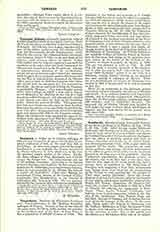

Tamburini, MICHELANGELO, fourteenth General of the Society of Jesus, b. at Modena, September 27, 1648; d. February 28, 1730. After having taught Scholastic philosophy and theology for twelve years, he was successively made rector of several colleges, was chosen by Cardinal Reynold of Este as his private theologian, held the offices of secretary general and vicar to Thyrsus Gonzalez, and finally, on the latter’s death, was elected general on January 3, 1706, a post which he occupied till his death. The reputation for solid virtue, patience, and courage, which he had acquired in the different grades of his order, was by no means dimmed in the long years of his generalate. During Tamburini’s superiorship, the apostolic activity of the Society was at its best; but, at the same time, could be seen signs of the storm which was, half a century later, to annihilate it. The Reductions of Paraguay were beginning to bear fruit; missionaries were laying down their lives for the pest-stricken in the Levant or were pushing into the steppes of Tibet amid untold hardships. Peter the Great, desirous of giving his barbarous subjects the benefits of true religion and genuine civilization, admitted the Jesuits into Russia. Jansenism, the Society‘s bitterest foe, received its death-blow in 1708 by a Bull of Clement XI ordering the suppression of Port-Royal. Three Jesuits, Tolomei, Cienfuegos, and Salerno, were, in short succession, raised to the dignity of the cardinalate. John Francis Regis was beatified, Aloysius of Gonzaga and Stanislaus Kostka were given; the honors of the altar. At the same time, future saints (St. Francis de Hieronymo and Bl. Anthony Baldinucci in Italy, Emmanuel Padial in Spain) were laboring with extraordinary success for the salvation of souls. But at this period, too, the debate over the Chinese Rites was at its height.
The Jesuit missionaries in China had been accused of not obeying the orders of the Supreme Pontiff. Tamburini, though naturally of a gentle disposition, could be firm when the honor of the Society was at stake. In the name of all the assistants and procurators gathered at Rome, he protested to Clement XI the fidelity and obedience of the whole Society to the Vicar of Christ. Thus ran the finishing sentence of his declaration: “But if, which God forbid, there be anyone among us who should harbor other thoughts or breathe other sentiments—for, where the number of subjects is so large, human prudence finds it difficult to prevent or hinder all such things—the General, in the name of the Society, declares, assures and protests that we reprove and reject him even now, that he is worthy of chastisement, and that he cannot be regarded as a true and legitimate son of the Society of Jesus“.
C. COTTER

